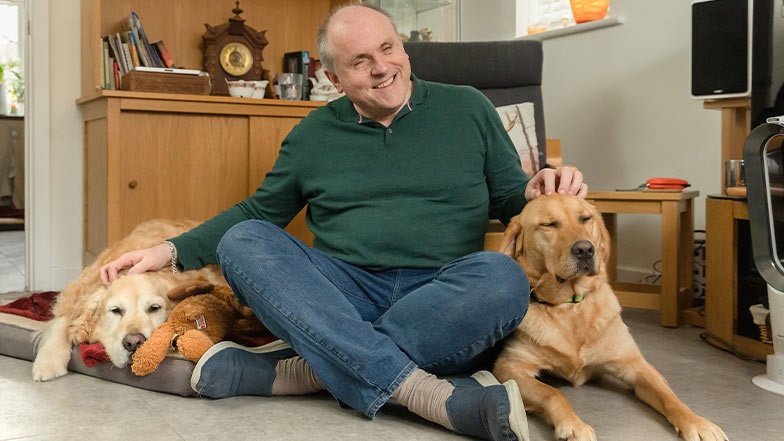The retirement of your guide dog
As your guide dog ages and their retirement approaches, it's important to consider what's best for the next stage of your lives. When you're nearing the end of your working partnership, the thought of being without your guide dog, or considering training with a new dog, can be a difficult time.
We're here to give you support and discuss your options with you. It's essential to think about what you might like to happen and talk things through with your friends and family, so you feel prepared when the time comes for your guide dog to retire.
When should your guide dog retire?
Your guide dog's retirement marks the end of your working partnership. There's no fixed retirement age for guide dogs; each dog retires when the time is right for them, based on their individual needs. Your Guide Dog Mobility Specialist will start discussing retirement options with you when your dog is around eight years old to help you prepare for what happens next, but your dog may not retire for a few more years.
What are the signs that your guide dog is approaching retirement?
As a guide dog owner, knowing the signs that your dog is approaching retirement is key. As your dog ages, they'll inevitably slow down, experience a few more aches and pains and may not be as energetic as they used to be. They may develop health issues, and you could find yourself visiting your vet more regularly.
It's not just your dog's body that may begin to decline; their mind might not be as sharp as it was, and you could notice your dog making the odd mistake or reacting more slowly. Being aware of these changes is important so you can do what is best for you and your dog, to keep you both safe and happy.
Your role as your guide dog approaches retirement
As your dog gets older, you'll need to continue to meet their welfare and health needs and check for signs that they need additional help and support.
In this video, guide dog owners John, Nathan and Veronica, and Guide Dog Mobility Specialist, Richard, share why and when a guide dog might retire as well as how our guide dogs spend their retirement after their working career.
How to prepare for your guide dog's retirement
Once you know your dog's retirement is approaching, it’s important to prepare yourself physically and emotionally. This involves staying fit and active and maintaining your orientation and mobility skills, so that you can continue to remain active and independent. This is a time of change, and we know that it can be a difficult time for many guide dog owners.
The decision to keep or rehome your guide dog
We’ll support and work with you to consider whether rehoming or keeping your retired guide dog is the right decision for your guide dog, as we want to ensure a happy and healthy retirement for your dog and make sure the decision is right for you as well. Your dog's wellbeing is vital, and you'll need to weigh up if you can meet the needs of an ageing dog whilst doing what is right for you, too.
Life after your guide dog retires
Adjusting to life without your guide dog is a big change. Whilst you may begin to consider thinking about another guide dog partnership, this isn't suitable for everyone, particularly if your needs or lifestyle have changed. If another guide dog isn’t the right choice for you, there are various options to explore.
Embracing technology, such as smartphone apps or mobility aids, can be helpful, along with additional orientation and mobility training to help you get around confidently without a guide dog. Exploring transport options and looking into help within the community are also essential to adapting to life without your guide dog. Whatever your situation, our team is here to offer guidance and to help you find the best mobility solution for your needs.
Feelings of grief and loss when your guide dog retires
After your guide dog retires, it's perfectly normal to experience feelings of grief and loss. This is a natural response to a significant change in your life. Your guide dog has been a loyal companion and partner for many years; adjusting to life without them by your side will take time. It's important to recognise and acknowledge these feelings and to allow yourself the space to process them.
You might want to talk to friends, family, or fellow guide dog owners about how you're feeling. They'll understand the unique bond you shared and expressing your emotions can be helpful.
The Blue Cross offer a pet loss support service, and their experienced and compassionate support staff are available by phone, webchat, and email. You can find out more about this service on the Blue Cross website. However, if these feelings persist, you should speak to a counsellor or support group who can offer additional support for coping and moving forward.
Find out more about the Pet Loss Support Service, how to get in touch, and how they can support you.

